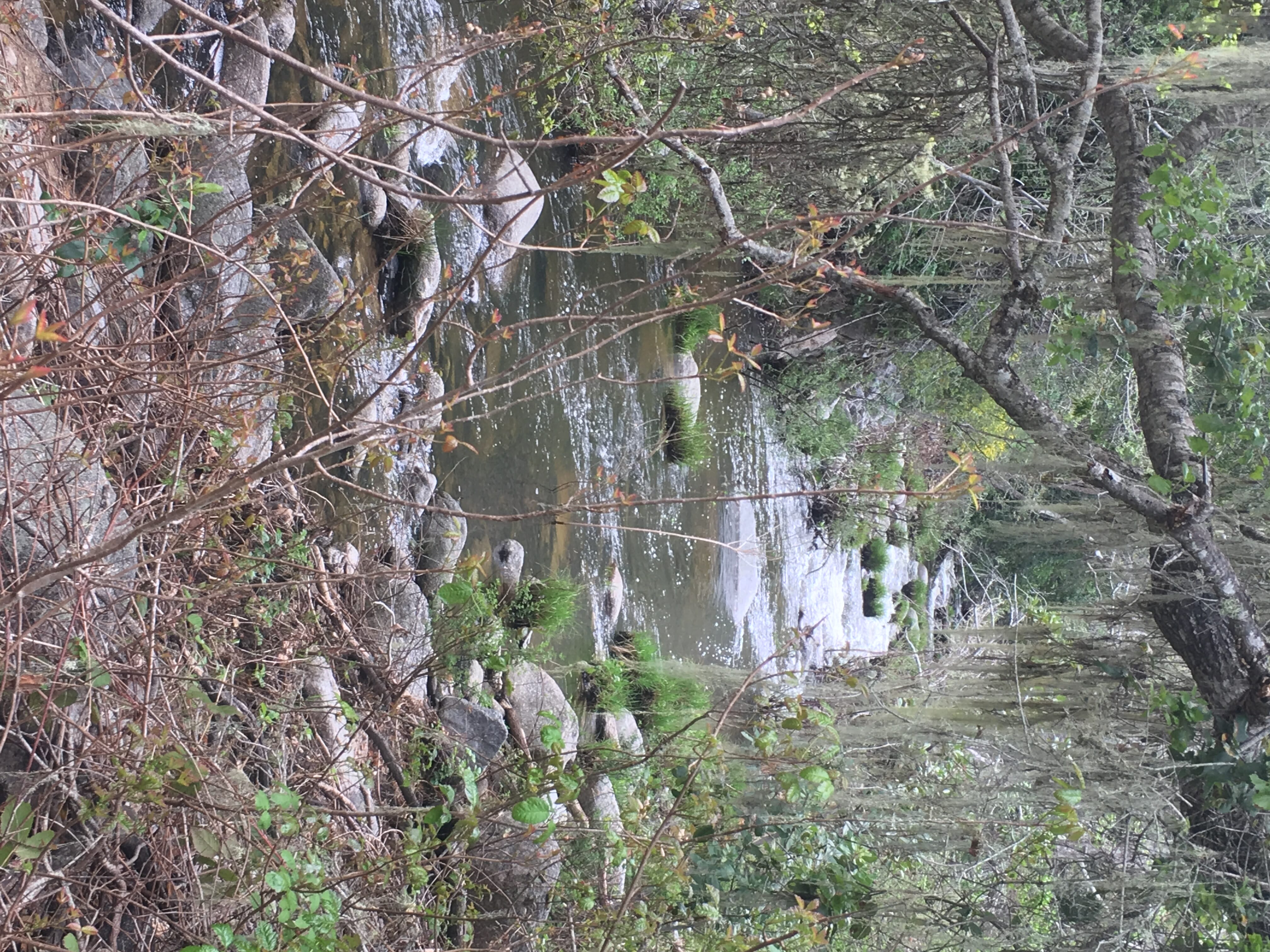Garza’s Creek, a tributary to the Carmel River.
By Sam Davidson
I’ve always been more of a shower guy. I like the feel of running water. I will stew in a hot spring or steam bath once every few years. But clamber into an in-home bathtub for a soak? Maybe three times since I was a kid.
Nonetheless it turns out that I have been taking baths frequently over the years. This fact was brought to my attention recently after a hike to look for spawning steelhead along Garzas Creek, a primary tributary to my home water, the Carmel River.
We found no slabby adult O. mykiss in the Garzas, still running slightly off-color after a winter of near-record rains in this part of the state. But under the oaks, maples and sycamores that form a continuous bower over this pretty little stream, all of them freshly budding out, you could just feel that at least a few still-bright steelhead had come in. I was not the least disappointed when we failed to observe them. In a few months I would find young-of-the-year in every likely pool. That was enough.
Back home, after picking ticks from my socks, I quaffed some orange juice and idly flipped through a couple of magazines strewn around the kitchen table. In one of them, an article entitled “The Art of Aging” caught my eye. The article offered tips on how to make time with your ally—one tip, in particular, stood out. It was a suggestion to “take walks in the woods.”
I have done this since my teens, often for no reason that I could articulate. I like walking under trees, in the same way I like wading a stream or the surf and chugging on foot through the Sierra backcountry. Beach, woods, talus slope, streambank, monzonite-strewn desert corridors where the silence is so heavy it roars—it’s never really mattered where I walked, as long as it was outside and scenic.
The article allowed as how the Japanese are big on nature walks, too. In fact, the Japanese have a term for such experiences that perfectly expresses their layered meaning. They call it Shinrin-yoku, which translates in English to “forest bathing.”
This notion is not new. Plenty of other cultures and philosophers—from the ancient Greeks to Thoreau— have described and hailed the cleansing effects of immersion in nature. The Japanese have, however, come up with the prettiest phrase to describe it.
As far as I can tell, this notion—that walking through the woods is the spiritual equivalent of bathing—is not limited to ambles among trees.
Thus I was bathing every time I stood, surfboard under my arm, at land’s end, the fringes of the tide swirling around my feet and the oncoming day purling among the dunes, as I contemplated the paddle-out. Similarly I was getting my ears scrubbed every time I leaned back from a finger lock, midway up a pitch of arcing granite, the sun flaring off quartz crystals and swallows slicing the air to ribbons below. Certainly I was bathing every time I stepped in a stream, shaking the leader out of the rod and eyeing the reach for the likely aim of the first cast.
I have always loved standing in a river, whether I was, to use the Gierach metaphor, “waving a stick” or not. When I was young, my brother and I spent entire summer days wading in Idaho’s Big Wood River, fishing for trout with worms and salmon eggs, and never wondered why we scrapped less than usual. And over the years I learned that, if you were peevish while fishing, and remained so, it was because you wished its company, carried it close, were somehow pleased with the stain. Otherwise a walk, or float, in the water would quickly dissolve such cares.
Thinking more than perhaps I should about ineffable things, I’ve come to imagine that wandering in the company of trees, water, wildflowers and wildlife rinses from me all the dirt and dissonance that builds up over days spent in traffic, at the keyboard, in the company of unlovely people. And now I know, thanks to a fine little turn-of-phrase from the Land of the Rising Sun, that it really does.
Sam Davidson is the communications director for TU’s California program. He lives and works on the banks of the Carmel River.



